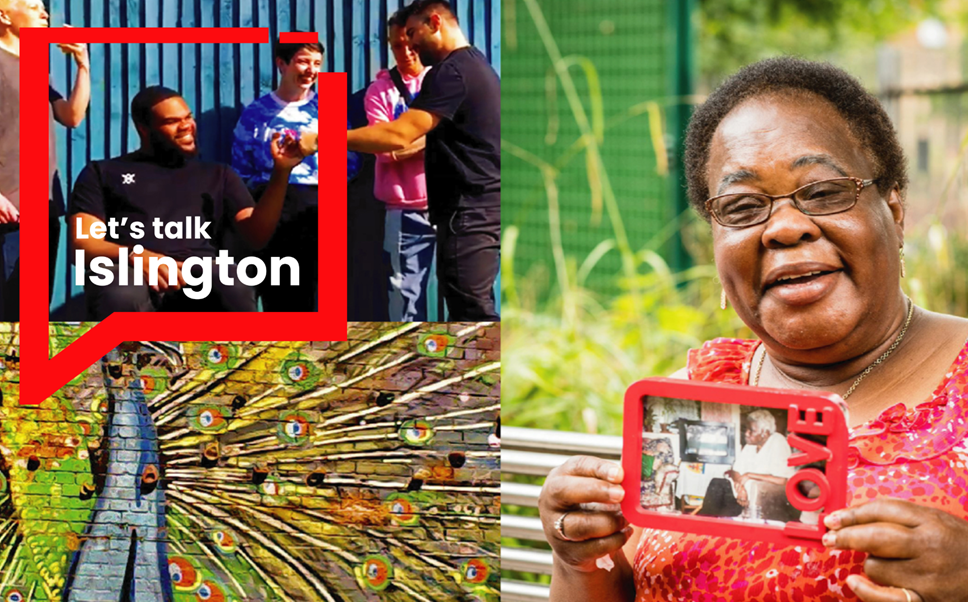
Community power can help Islington to confront inequality and poverty, task force suggests
Community power – giving communities greater opportunity to contribute to how local decisions are made and how local services are run – can help Islington build a more equal future, the Task Force on Inequality in Islington suggests this week.
The task force’s recommendation comes as Islington Council publishes the results of Let’s Talk Islington, the borough’s biggest-ever public engagement programme, where the council heard from more than 6,000 local people, of different ages and backgrounds, focusing on tackling the issues that matter to them and making Islington a more equal place.
Residents’ feedback included:
- There are widespread perceptions of inequality in Islington, across many age groups
- Housing and safety were among the top priorities in workshops and the survey
- Residents highlighted the importance of joined-up work to tackle inequality
- Looking ahead 10 years, the environment – a cleaner, greener borough - was a priority for many
- Many people also took pride in Islington’s inclusiveness and diversity, though some also raised concerns about division and exclusion
Let’s Talk Islington included a survey, sessions with schools, workshops, lunch clubs, and innovative engagement with LGBTQ+ residents, older people and young people with special educational needs.
At the same time as Let’s Talk Islington, the Task Force on Inequality in Islington has been examining how communities can tackle inequality together, and real issues affecting local people.
The task force included local councillors and community leaders as well as Professor Donna Hall, chair of New Local; Sam Gurney, the London, East and South East Regional Secretary for the TUC; and Neil Tester, former Director of the Richmond Group of Charities.
Its report, published this week, highlights the advantages of community power, which can have more impact on tackling poverty and inequality than old “top-down” ideas.
The report highlights, as an example, the We Are Cally initiative around Caledonian Road, where local residents produced a community plan after a six-month participation project. The council is now investing more than £1.5 million in the area, making improvements to a community centre, library and park, and has set up a grants programme to support residents to set up mutual aid groups, manage green spaces and establish local community activities.
The task force’s report, published this week, recommends using the We Are Cally approach as an example to be repeated across Islington and suggests that the council identifies the communities in most need of support and initiates an open conversation, to get to the bottom of the issues they face and work together to create more equal communities.
Cllr Nurullah Turan, chair of the Taskforce on Inequality in Islington, said: “Islington is one of the most unequal boroughs in the country, with huge gaps between ‘haves’ and ‘have-nots’, often living beside each other.
“Inequality is about more than differences of wealth and income – while addressing that gap is vital, there are also inequalities of power and access, with less well-off people excluded from aspects of life that others take for granted.
“It is very challenging for councils to address inequality, but they must do so. The task force’s suggestion of more community power – giving communities facing inequality and poverty more of a voice in local decisions and services that affect them – can be a powerful way forward, and an alternative to old-fashioned attempts to bring change from above, that are well-meaning but not always successful.”
Cllr Kaya Comer-Schwartz, Leader of Islington Council, said: “We’re committed to building a more equal Islington, where everyone can thrive.
“We’re very grateful to the more than 6,000 local residents who spoke to us about inequality in Islington, and for the hard work, analysis and recommendations of the Taskforce on Inequality in Islington.
“The responses to Let’s Talk Islington, and the task force’s report, will shape the bedrock of our work to tackle inequality across Islington and lay the foundations of our strategy for the next 10 years.”
The Islington Together 2030 Plan – Islington Council’s detailed response to Let’s Talk Islington and the Islington Inequality Task Force’s findings – will be published in 2023.
Notes to editor
Click here to read the full Let's Talk Islington Community Engagement Report.
Click here to read the full report by the Task Force on Inequality in Islington.
For more information on Let's Talk Islington, visit islington.gov.uk/letstalk
Contact information
If you are a member of the public with a general question about the council please view the contact information on our website or call 020 7527 2000.
